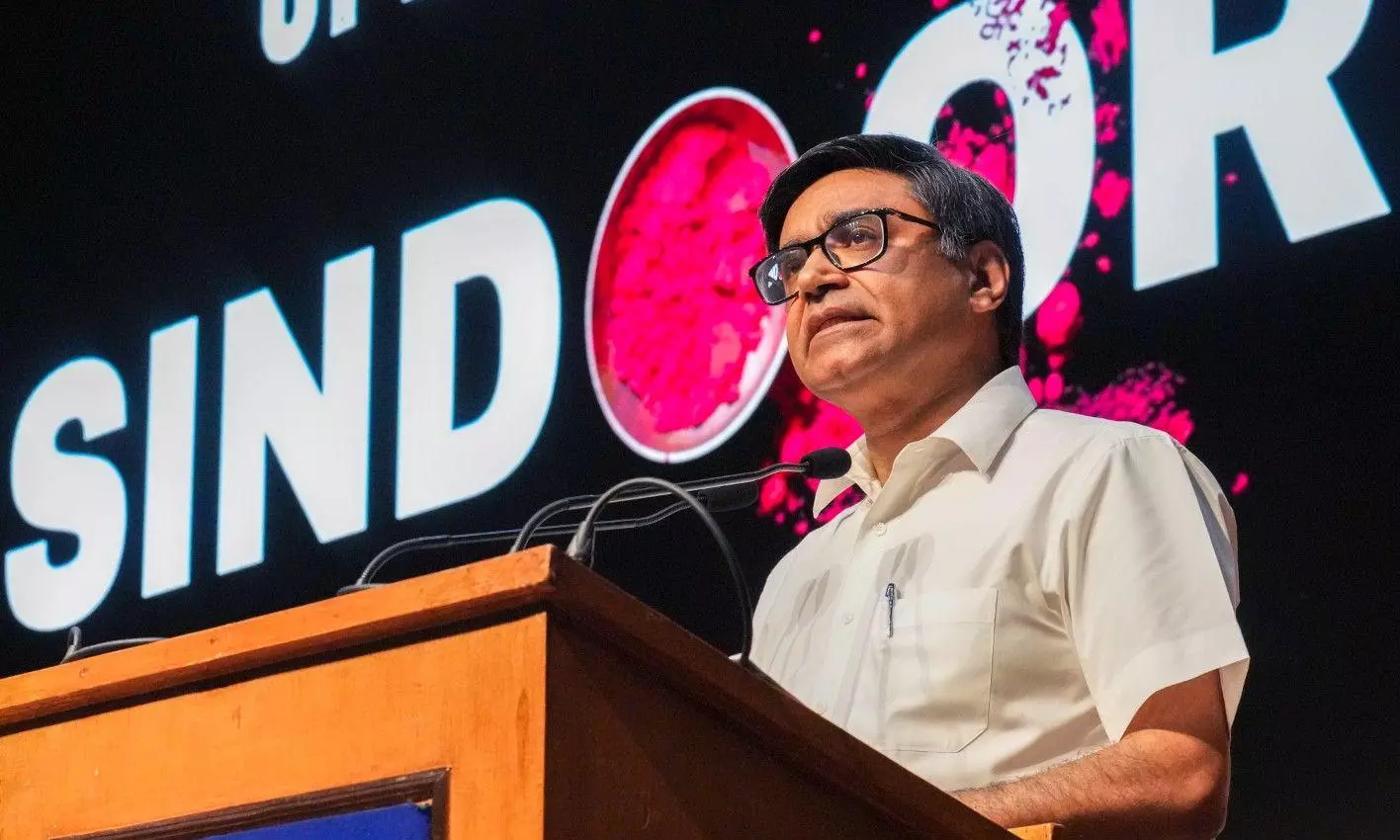
- Home
- India
- World
- Premium
- THE FEDERAL SPECIAL
- Analysis
- States
- Perspective
- Videos
- Sports
- Education
- Entertainment
- Elections
- Features
- Health
- Business
- Series
- In memoriam: Sheikh Mujibur Rahman
- Bishnoi's Men
- NEET TANGLE
- Economy Series
- Earth Day
- Kashmir’s Frozen Turbulence
- India@75
- The legend of Ramjanmabhoomi
- Liberalisation@30
- How to tame a dragon
- Celebrating biodiversity
- Farm Matters
- 50 days of solitude
- Bringing Migrants Home
- Budget 2020
- Jharkhand Votes
- The Federal Investigates
- The Federal Impact
- Vanishing Sand
- Gandhi @ 150
- Andhra Today
- Field report
- Operation Gulmarg
- Pandemic @1 Mn in India
- The Federal Year-End
- The Zero Year
- Science
- Brand studio
- Newsletter
- Elections 2024
- Events
- Home
- IndiaIndia
- World
- Analysis
- StatesStates
- PerspectivePerspective
- VideosVideos
- Sports
- Education
- Entertainment
- ElectionsElections
- Features
- Health
- BusinessBusiness
- Premium
- Loading...
Premium - Events

When matters get out of hand, we shouldn’t shy away from filing a police complaint; the need of the hour is anti-trolling legislation
A career diplomat with 35 years of experience. A man who was the private secretary to prime ministers Indra Kumar Gujral, Manmohan Singh and Narendra Modi. A diplomat who was part of a key strategy meet when the India-China border skirmish broke out. A former Indian ambassador to China and a former deputy national security advisor.
None of these high-ranking achievements mean anything to a troll.
Foreign Secretary Vikram Misri, who was at the heart of disseminating information on Operation Sindoor right from May 7, found himself in an unexpected situation when an entire army of abusers insulted him personally and also targeted his daughter and family, blaming him for settling for a ceasefire with Pakistan.
Misri under attack
Every aspect of Misri’s life — right from his birth in Srinagar, to his daughter working for the UNHCR in Myanmar and advocating for the rights of the Rohingyas — was put to disrepute.
It all happened on May 10, when the Foreign Secretary held his second briefing of the day. It was a short statement at 6 pm, where he said the director general of military operations of Pakistan called his Indian counterpart and urged for a ceasefire.
This was agreed to with the next course of strategy to be discussed on May 12.
Also read | Tharoor slams trolls abusing foreign secretary Vikram Misri over Op Sindoor
Within minutes, an army of trolls came at him. They came in waves, and droves. Much like how Pakistan sent drones and unarmed aerial vehicles.
Blamed for truce
The strategy was to pin the blame on the Foreign Secretary for agreeing to a ceasefire.
General knowledge is limited among trolls. Even the unlettered will tell you this wasn’t his decision alone. He was just a messenger.
I liken trolls' modus operandi to that of terrorist organisations. They are essentially mercenaries recruited by their handlers from behind the keyboard.
The onslaught was so massive and caused so much distraction in the life of the Foreign Secretary that Misri decided to lock his X account.
There are news reports that suggest that Misri's daughter’s personal mobile numbers were circulated on social media, almost a dog whistle to an army of the uncivilised to call and harass her.
Daughter targeted
Many of these tweets called Misri and his daughter 'traitors'. To build their argument, the daughter’s reported engagements for the Rohingya refugees and his family’s Kashmiri ethnicity were put to question.
Thankfully, better sense prevailed. Soon the trolls were outnumbered by those who came in support of the Foreign Secretary. Many of the trolling tweets have been deleted and — however delayed — IAS associations and colleagues in the foreign office are now speaking in his favour.
I am sure Misri experienced this for the first time.
Trolling business
Trolls and their ecosystems are easy to identify. Having been subject to their harassment on innumerable occasions, I would like to share my experience.
Also read | Online threats: Why the potential rapists walk unleashed
It starts with identifying and differentiating between criticism and trolling. As someone in the profession of journalism, our reports and opinion often draw sharp criticism. Criticism is important. It teaches us to be alert and to be correct.
There is no reason why the same rule cannot be applied in any profession.
Trollers are mercenaries
However, trolling is different. And I liken their modus operandi to that of terrorist organisations.
Trollers are essentially mercenaries. They are recruited by their handlers from behind the keyboard. These handlers give these mercenaries specific tasks.
The motive almost always is destruction of character, bringing the person’s personality to disrepute, and targeted and personal harassment, which will not even spare family members.
They have a pattern. The handler of these keyboard mercenaries will give them a maximum of one or two points against an individual. All that these trollers will then do is to build abusive and rhetorical arguments around those limited points.
Trollers akin to terrorists
These handlers offer their services to anyone who wants them. Most political parties have their own trolling ecosystem. Their services are engaged to do things that many would consider indecent. A majority of these trollers operate in anonymity.
Watch | Khushbu Sundar: Why do female MPs have to wear sarees and high-neck blouses?
Sometimes, just like it happens with terrorists, these trollers start thinking ahead of themselves. They then become, just like terrorists, Frankenstein monsters.
They won’t shy away from biting the hand that once fed them. Remember, they are mercenaries.
What is to be done?
A normal criticism never gets overly personal and is not abusive. It is done with the intention of improving what you’re doing above. There is a feeling of respect and, more importantly, most of the critics are individuals who don’t shy away from identifying themselves.
Now that we have established the difference between criticism and trolling, what does one do?
I have a simple formula. If a person online is compelled enough to abuse, then that person has no right to be heard. They must be subjected to the block button.
I know it is a tedious job because these trolling mercenaries are just too many, and your time is precious. But in a graded response to online abuse, this can be your first step.
The mysterious masters
If the matter does get out of hand, like it did in Misri's case, where personal details began to be shared, we shouldn’t shy away from filing a police complaint. The Foreign Secretary must do this.
Remember, these trolling ecosystems and their keyboard handlers enjoy political patronage. So, if action is not taken against them, we will clearly know who is providing the patronage and how these ecosystems continue to thrive.
Trolling isn’t as harmless as it appears. While one can learn to ignore, the risk is real when it comes to a majority of the comments targeting the family and sharing personal details.
Need for law
It will serve well to the collective political ecosystem to first abjure the use of trollers. Secondly, even consider bringing in a law and making this a punishable offence.
An anti-trolling act is the need of the hour. Which will have a clear definition of online hate and clear provision for penal action.
The key point is: will the beneficiaries of trolling be interested in a solution?(The Federal seeks to present views and opinions from all sides of the spectrum. The information, ideas or opinions in the article are of the author and do not necessarily reflect the views of The Federal.)


